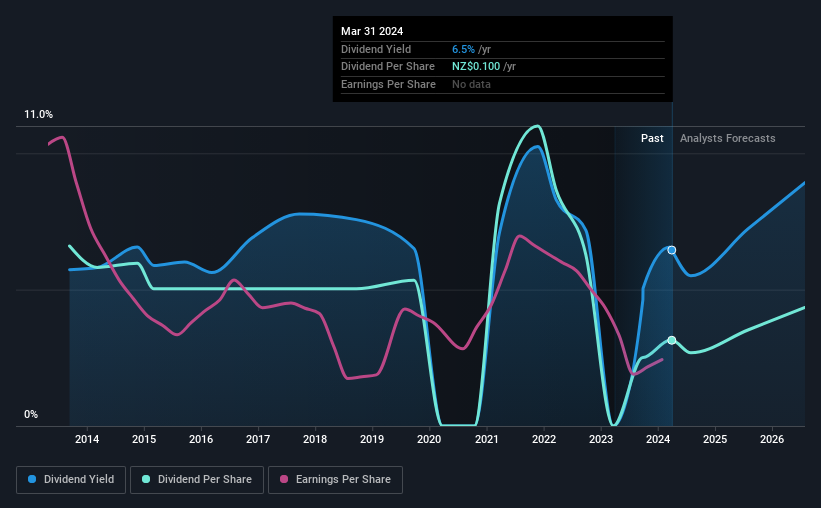The Warehouse Group Limited (NZSE:WHS) is about to trade ex-dividend in the next four days. The ex-dividend date is usually set to be one business day before the record date which is the cut-off date on which you must be present on the company’s books as a shareholder in order to receive the dividend. It is important to be aware of the ex-dividend date because any trade on the stock needs to have been settled on or before the record date. Thus, you can purchase Warehouse Group’s shares before the 5th of April in order to receive the dividend, which the company will pay on the 23rd of April.
The company’s next dividend payment will be NZ$0.0588235 per share, on the back of last year when the company paid a total of NZ$0.10 to shareholders. Based on the last year’s worth of payments, Warehouse Group has a trailing yield of 6.5% on the current stock price of NZ$1.55. Dividends are an important source of income to many shareholders, but the health of the business is crucial to maintaining those dividends. So we need to investigate whether Warehouse Group can afford its dividend, and if the dividend could grow.
View our latest analysis for Warehouse Group
Dividends are typically paid out of company income, so if a company pays out more than it earned, its dividend is usually at a higher risk of being cut. Warehouse Group paid out 117% of profit in the past year, which we think is typically not sustainable unless there are mitigating characteristics such as unusually strong cash flow or a large cash balance. A useful secondary check can be to evaluate whether Warehouse Group generated enough free cash flow to afford its dividend. Luckily it paid out just 17% of its free cash flow last year.
It’s disappointing to see that the dividend was not covered by profits, but cash is more important from a dividend sustainability perspective, and Warehouse Group fortunately did generate enough cash to fund its dividend. If executives were to continue paying more in dividends than the company reported in profits, we’d view this as a warning sign. Very few companies are able to sustainably pay dividends larger than their reported earnings.
Click here to see the company’s payout ratio, plus analyst estimates of its future dividends.
Have Earnings And Dividends Been Growing?
Companies with consistently growing earnings per share generally make the best dividend stocks, as they usually find it easier to grow dividends per share. If earnings decline and the company is forced to cut its dividend, investors could watch the value of their investment go up in smoke. With that in mind, we’re encouraged by the steady growth at Warehouse Group, with earnings per share up 6.8% on average over the last five years.
The main way most investors will assess a company’s dividend prospects is by checking the historical rate of dividend growth. Warehouse Group’s dividend payments per share have declined at 7.2% per year on average over the past 10 years, which is uninspiring. It’s unusual to see earnings per share increasing at the same time as dividends per share have been in decline. We’d hope it’s because the company is reinvesting heavily in its business, but it could also suggest business is lumpy.
Final Takeaway
Has Warehouse Group got what it takes to maintain its dividend payments? Warehouse Group has been steadily growing its earnings per share, and it is paying out just 17% of its cash flow but an uncomfortably high 117% of its income. In summary, it’s hard to get excited about Warehouse Group from a dividend perspective.
So if you want to do more digging on Warehouse Group, you’ll find it worthwhile knowing the risks that this stock faces. Our analysis shows 2 warning signs for Warehouse Group and you should be aware of these before buying any shares.
If you’re in the market for strong dividend payers, we recommend checking our selection of top dividend stocks.
Have feedback on this article? Concerned about the content? Get in touch with us directly. Alternatively, email editorial-team (at) simplywallst.com.
This article by Simply Wall St is general in nature. We provide commentary based on historical data and analyst forecasts only using an unbiased methodology and our articles are not intended to be financial advice. It does not constitute a recommendation to buy or sell any stock, and does not take account of your objectives, or your financial situation. We aim to bring you long-term focused analysis driven by fundamental data. Note that our analysis may not factor in the latest price-sensitive company announcements or qualitative material. Simply Wall St has no position in any stocks mentioned.






